Hard rock or heavy rock is a loosely defined subgenre of rock music typified by aggressive vocals and distorted electric guitars. Hard rock began in the mid-1960s with the garage, psychedelic and blues rock movements. Some of the earliest hard rock music was produced by the Kinks, the Who, the Rolling Stones, Cream, Vanilla Fudge, and the Jimi Hendrix Experience. In the late 1960s, bands such as Blue Cheer, the Jeff Beck Group, Iron Butterfly, Led Zeppelin, Golden Earring, Steppenwolf, and Deep Purple also produced hard rock.

Congregation is the third studio album by American alternative rock band The Afghan Whigs, released on January 31, 1992, by Sub Pop. After touring for two years in support of their 1990 album Up in It, the band received a $15,000 advance from Sub Pop to record a follow-up album. It was primarily recorded at Bear Creek Studios in Woodinville and Buzz's Kitchen in Los Angeles during July to August 1991. The band's frontman Greg Dulli produced the album entirely with audio engineer Ross Ian Stein. The album's production and release were hindered by Sub Pop's financial difficulties, which were eventually resolved by the massive commercial success of Nirvana's 1991 album Nevermind.
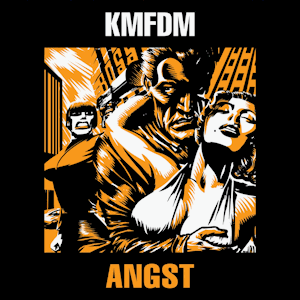
Angst is the seventh studio album by German industrial band KMFDM, released on 12 October 1993 by Wax Trax! Records.

Down on the Upside is the fifth studio album by the American rock band Soundgarden, released on May 21, 1996, through A&M Records. Following a worldwide tour in support of its previous album, Superunknown (1994), Soundgarden commenced work on a new album. Self-produced by the band, the music on the album was notably less heavy and dark than the group's preceding albums and featured the band experimenting with new sounds.

"Tie Your Mother Down" is a song by the British rock band Queen, written by lead guitarist Brian May. It is the opening track and the second single from their 1976 album A Day at the Races. On its original release as a single in 1977 the song peaked at 31 in the UK Singles Chart. More than 20 years later, it was released as a double a-side to "No-One but You " where it reached 13 in UK Singles Chart. On the album the song is preceded by a one-minute instrumental intro featuring a Shepard tone melody, performed by Brian May, which is reprised in the ending of "Teo Torriatte": this was intended to create a "circle" within the album.
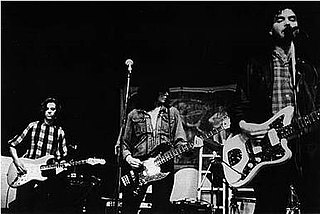
Band of Susans was an American alternative rock band formed in New York City in 1986 and active until 1996. It originally consisted of Robert Poss (guitar/vocals), Susan Stenger (bass/vocals), Ron Spitzer (drums), with Susan Lyall (guitar), Susan Tallman (guitar), and Alva Rogers (vocals). The band would undergo several permutations over the years, usually involving three guitarists. Poss, Stenger, and Spitzer were the band's core members throughout its duration. They originated in the New York noise rock scene, but due to their layered guitar sound were sometimes seen as the American counterparts to the UK shoegazing bands and also drew influence from modern experimental composers Rhys Chatham and Glenn Branca.

Romantic Warrior is the sixth studio album by the American jazz fusion band Return to Forever, released in 1976 by Columbia Records. After releasing their previous album, No Mystery (1975), their fourth for Polydor Records, the group moved to Columbia and retreated to Caribou Ranch near Nederland, Colorado to record their next album. It was also their first to be credited solely to Return to Forever, removing the "featuring Chick Corea" tag. The album is more avant-garde and less funky than No Mystery, and remains the band's highest selling album with over 500,000 copies sold in the US.
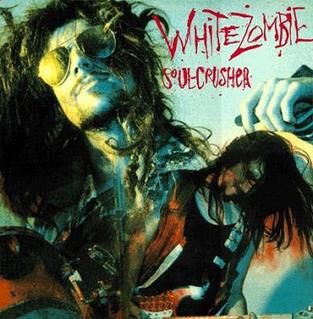
Soul-Crusher is the debut studio album by American rock band White Zombie, released independently in November 1987 by Silent Explosion. It was the band's second and final release with Tom "Five" Guay on guitar. Building off the sound established on Psycho-Head Blowout, the band matured its sound while placing further emphasis on the individual roles of its players. The album caught the attention of major labels and in 1988 was adopted and re-issued by Caroline Records.

Richard Hugh Blackmore is an English guitarist and songwriter. He was a founding member of Deep Purple in 1968, playing jam-style hard rock music that mixed guitar riffs and organ sounds. He is prolific in creating guitar riffs and has been known for playing both classically influenced and blues-based solos.

Love Agenda is the second album by Band of Susans, released on April 17, 1989 by Blast First and Restless Records. Page Hamilton, later frontman for Helmet, played guitar on the album and sang the lead vocals on the track "It's Locked Away". Also notable was bassist Susan Stenger singing her first lead vocals on the songs "The Pursuit of Happiness", "Birthmark" and "Hard Light". Robert Poss was an admirer of the Rolling Stones and CD versions of Love Agenda features a cover of "Child of the Moon".

The Peel Sessions is an EP by Band of Susans, recorded in 1988 and 1989 from sessions with John Peel but not released until 1992.

The Word and the Flesh is the third studio album and fourth album overall by American noise rock band Band of Susans. For the first time in the band's history, they were able to find a settled lineup to back up the band's core-line up of band leader Robert Poss, Susan Stenger and drummer Ron Spitzer, after Karen Higlof and Page Hamilton departed the band following the release of Love Agenda (1989). With Anne Husick and Mark Lonergan replacing them, the band entered their "classic line-up" and recording The Word and the Flesh in New York City in spring 1990, with Poss acting as producer.
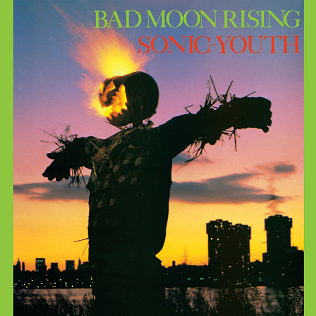
Bad Moon Rising is the second studio album by American rock band Sonic Youth, released on March 29, 1985, by Blast First and Homestead Records. The album is loosely themed around the dark side of America, including references to obsession, insanity, Charles Manson, heavy metal, Satanism, and early European settlers' encounters with Native Americans.

Long Hair In Three Stages is the debut studio album by the Chicago-based experimental rock quartet U.S. Maple. After recording a debut single, they recorded the album in late 1995 at the Solid Sound Studios in Illinois with producer Jim O'Rourke. It was O'Rourke's first recording session with a rock band.

Fire Make Thunder is the fourth studio album by American progressive rock band OSI, released by Metal Blade Records on March 27, 2012 in Europe and North America.

"Listen, the Snow Is Falling" is a song written by Yoko Ono and recorded by Ono and the Plastic Ono Band that was first released as the B-side of John Lennon's 1971 single "Happy Xmas ." A version of the song was later released on a reissue of Lennon and Ono's Wedding Album and was covered by Galaxie 500.
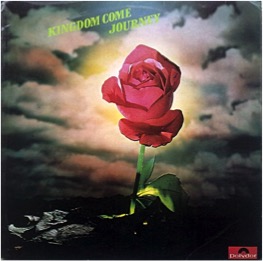
Journey is the third and final studio album by British rock band Kingdom Come, known as Arthur Brown's Kingdom Come outside the UK. After the band featured drastically different styles on their first two albums, and after several line-up changes, band leader Arthur Brown worked the band towards a new direction for Journey. The album was the first album in history to use a drum machine responsible for all the percussive sounds on the album. The drum machine in question was the Bentley Rhythm Ace, manufactured by Ace Tone. Although the band had commented the album was entirely based on the drum machine, the band attempted to, in rock and electronic terms, create an album that was the closest they could get "to a string quartet". The album features other experimental techniques, including using a triangle to guide guitar playing and extensive use of Mellotron and synthesizers from new member Victor Peraino, who replaced Michael "Goodge" Harris early on production.

Wired for Sound is a compilation album by Band of Susans, released in 1995 by Blast First.
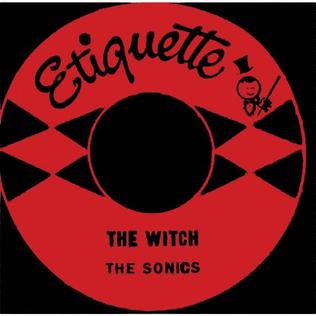
"The Witch" is a song by the American garage rock band the Sonics, written by vocalist Gerry Roslie, and first released as the group's debut single in November 1964. It also appears on the Sonics' debut album Here Are the Sonics!!!. Arguably among the most frantic and heaviest recordings of the era, "The Witch" is regarded as being a quintessential stepping stone in the development of punk rock despite the fact the tune never reached national success. Since the song's original release, "The Witch" has appeared on numerous compilation albums, most notably the 1998 reissue of Nuggets: Original Artyfacts from the First Psychedelic Era, 1965–1968.

Admission is the fifth and final studio album by American metal band Torche, released on July 12, 2019, through Relapse Records. This is the band's first material since their previous album Restarter, released in 2015. The album was produced, engineered and mixed by longtime bassist Jonathan Nuñez and is the first to feature Eric Hernandez on bass guitar after former guitarist Andrew Elstner's departure in November 2016. Admission was well received by music critics and scored 80/100 on Metacritic.





















